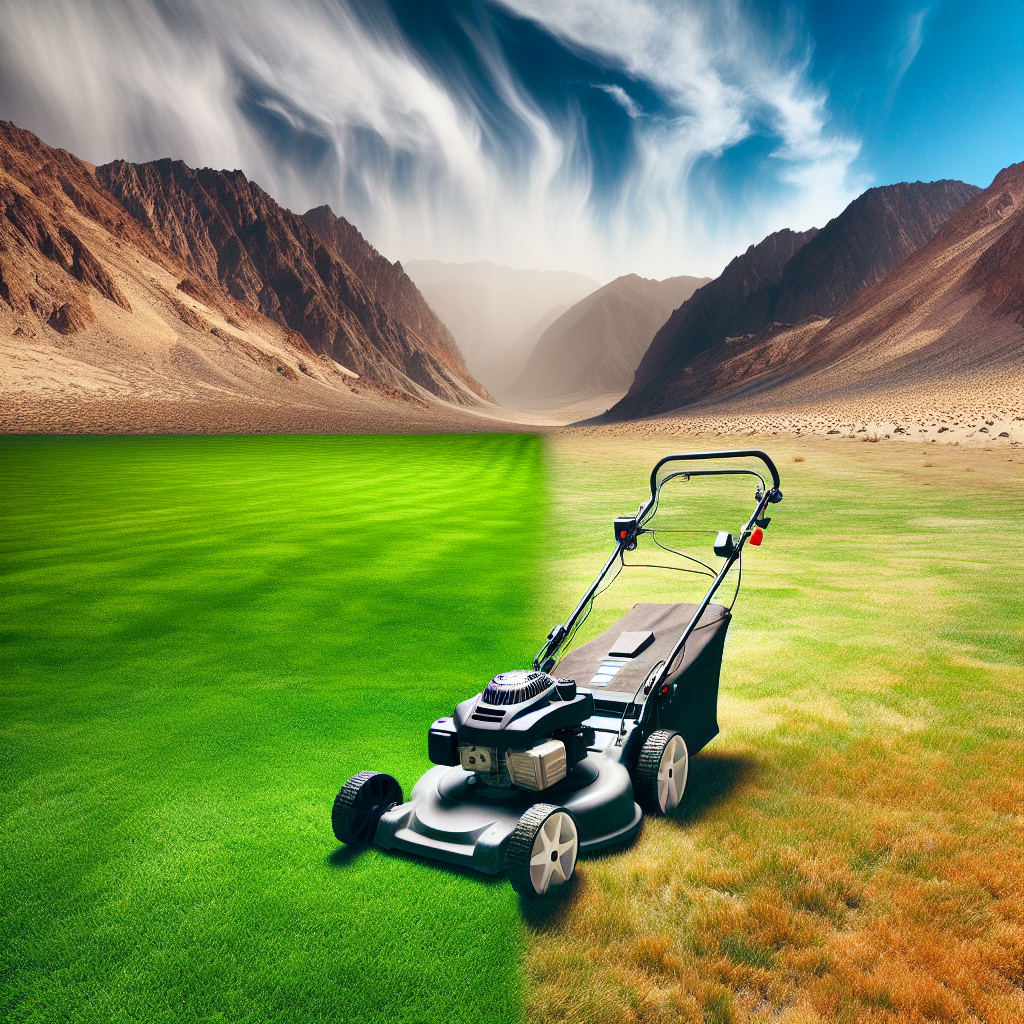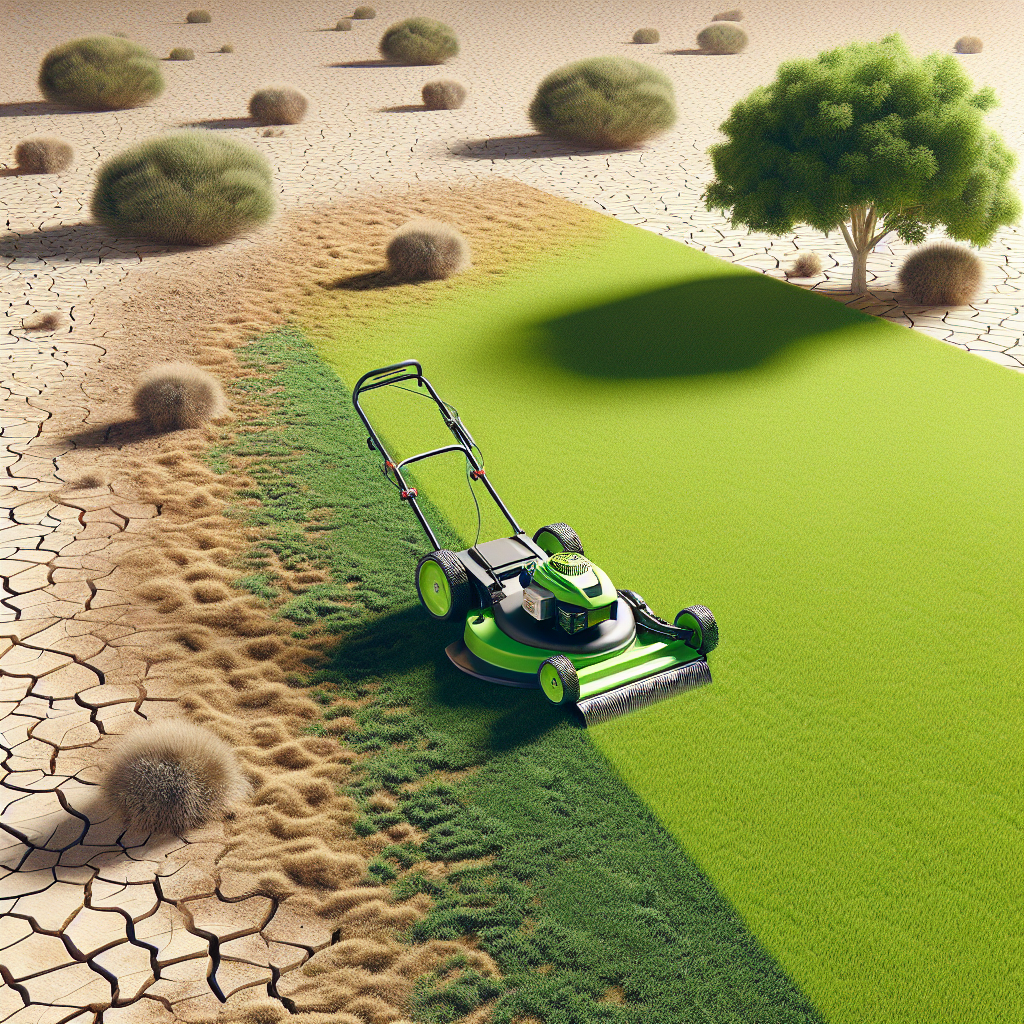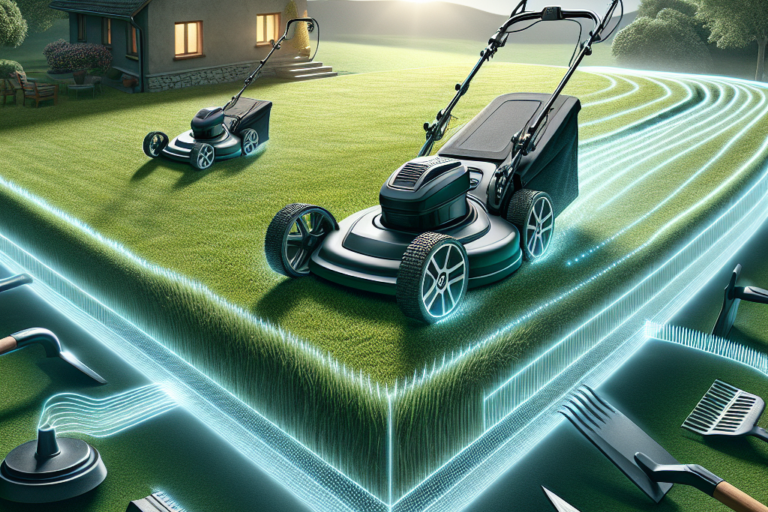In dry, arid climates, the performance of electric mowers becomes a top concern for homeowners. As you navigate through the challenges of maintaining a well-kept lawn in these conditions, it’s only natural to wonder how electric mowers fare against the harsh backdrop of scorching heat and limited water availability. In this article, we will explore the performance of electric mowers in such climates and unravel the secrets behind their efficiency and effectiveness.
Environmental Considerations
Water Conservation
In dry, arid climates, water conservation is of utmost importance. Traditional gas-powered mowers can contribute to water wastage through evaporation. Electric mowers, on the other hand, do not emit any harmful gases and thus do not contribute to water evaporation. This makes them a more eco-friendly choice for homeowners in such climates who are looking to conserve water resources.
Air Quality
A major concern in arid regions is air pollution caused by gas-powered mowers. These mowers release harmful emissions, including carbon monoxide and volatile organic compounds, which contribute to poor air quality. Electric mowers, on the other hand, produce zero harmful emissions, leading to cleaner and healthier air in the surrounding environment.
Noise Pollution
Another factor to consider is noise pollution. Gas-powered mowers typically produce a loud and disruptive noise that can disturb the peace and tranquility of residential areas. Electric mowers, on the contrary, operate much more quietly, reducing the overall noise pollution and creating a more peaceful environment for both homeowners and their neighbors.
Effectiveness of Electric Mowers
Cut Quality
One of the primary concerns when considering an electric mower in a dry, arid climate is its effectiveness in achieving a good cut. Electric mowers are equipped with sharp blades that can provide a clean and precise cut. However, it is important to note that the performance can vary depending on the specific model and the type of grass being mowed.
Power Output
Electric mowers have made significant advancements in power output over the years. While gas mowers have traditionally been known for their high power, electric mowers are now available with powerful motors that can effectively handle the demands of mowing in dry, arid climates. With adequate power, electric mowers can easily tackle even thick and tough grass.
Battery Life
Battery life is a crucial factor to consider when using an electric mower in arid climates. Longer cutting times due to the dry and arid conditions may require a mower with a longer battery life to ensure uninterrupted operation. It is advisable to choose a mower with a battery that can last for a sufficient duration to complete the mowing task without interruptions or the need for recharging.

Growth Conditions in Dry, Arid Climates
Types of Grass
The type of grass that thrives in dry, arid climates plays a significant role in determining the effectiveness of electric mowers. Certain types of grass, such as Bermuda grass or buffalo grass, are better suited to withstand the harsh conditions of these climates. Electric mowers need to be able to handle these grass types effectively to provide optimal results.
Soil Composition
Dry, arid climates often have soil with limited moisture content. The soil composition can affect the overall growth of grass and, subsequently, the mowing process. Electric mowers should be equipped to handle different soil compositions, ensuring efficient cutting without causing damage to the grass or the underlying soil.
Watering Requirements
With limited rainfall in arid climates, grasses often require regular watering to stay healthy. The watering requirements can vary depending on the type of grass and the prevailing climate conditions. When choosing an electric mower, it is essential to consider the watering requirements of the grass and ensure that the mower’s operation does not negatively impact the watering schedule.
Adaptability of Electric Mowers
Proper Maintenance
Proper maintenance is key to ensuring the longevity and adaptability of electric mowers in arid climates. Regular cleaning, blade sharpening, and general upkeep are essential to keep the mower in optimal condition. Following the manufacturer’s maintenance guidelines and schedules will help ensure the mower performs well in the challenging conditions of dry, arid climates.
Blade Options
Electric mowers often offer a range of blade options to cater to different mowing needs. Depending on the grass type and height, different blade options may be more suitable for achieving the desired cut quality. Exploring the different blade options available for electric mowers can help optimize their adaptability in dry, arid climates.
Mulching Ability
Mulching is the process of finely chopping grass clippings and leaving them on the lawn as a natural fertilizer. An electric mower’s ability to mulch effectively can greatly enhance its adaptability in dry, arid climates. Mulching adds valuable nutrients back into the soil, reducing the need for additional fertilizers and promoting healthier grass growth.

Limitations of Electric Mowers
Longer Cutting Times
When compared to gas mowers, electric mowers may have a longer cutting time. The battery life and power output of electric mowers may lead to a slower pace of mowing, especially when dealing with thick or overgrown grass. Homeowners in arid climates need to consider the potential additional time required to complete their mowing tasks.
Thicker or Overgrown Grass
Electric mowers can sometimes struggle with thicker or overgrown grass, particularly in arid climates where growth can be rapid due to occasional rainfall. It is important to ensure that the chosen electric mower has sufficient power and cutting capabilities to handle such challenging conditions effectively.
Potential Overheating
In extremely hot and dry climates, electric mowers may be susceptible to overheating due to prolonged use. High temperatures can affect the performance and battery life of the mower. To mitigate the risk of overheating, it is advisable to choose a mower with built-in cooling mechanisms and follow the recommended mowing durations to prevent excessive strain on the equipment.
Considerations for Choosing an Electric Mower
Power Source Options
Electric mowers typically come in two main power source options: corded and cordless. Corded mowers need to be plugged into an electrical outlet for operation, providing a constant power supply. Cordless mowers, on the other hand, are powered by rechargeable batteries, offering increased mobility but limited battery life. Evaluating the specific needs and mowing requirements of your lawn will help determine the most suitable power source option.
Cutting Width
The cutting width of a mower refers to the width of grass that can be cut in a single pass. The choice of cutting width depends on the size of the lawn and the desired mowing efficiency. In arid climates, where grass growth can be uneven and sporadic, opting for a wider cutting width may help expedite the mowing process and cover larger areas more efficiently.
Battery Type
For cordless electric mowers, the type of battery used is an important consideration. Lithium-ion batteries are widely recognized for their long-lasting power, faster charging times, and overall reliability. Opting for a mower with a high-quality lithium-ion battery can help ensure uninterrupted operation in arid climates, where longer cutting times may be required.
Tips for Efficient Mowing in Arid Climates
Mowing Frequency
To maintain a healthy lawn in arid climates, mowing frequency should be adjusted accordingly. Frequent mowing at taller heights can help promote deeper root growth and reduce water requirements. It is recommended to mow when the grass reaches approximately one-third taller than its desired height, ensuring the grass remains healthy and able to withstand the challenging climate conditions.
Proper Mowing Height
Setting the correct mowing height is essential for a thriving lawn in arid climates. Cutting the grass too short can expose the roots to harsh sunlight, increasing water evaporation and hindering growth. On the other hand, allowing the grass to grow too tall can create shade that prevents lower sections from receiving adequate sunlight. Finding the right balance and adjusting the mowing height according to the grass type will help maintain the lawn’s health and resilience.
Watering Schedules
Establishing an appropriate watering schedule is crucial in dry, arid climates. Watering in the early morning or late evening when temperatures are cooler minimizes evaporation and ensures maximum absorption by the grass. It is advisable to monitor soil moisture levels and adjust the watering schedule as needed to meet the specific requirements of the grass type and prevailing climate conditions.
The Role of Innovations in Electric Mower Performance
Smart Technology Integration
Recent innovations in electric mower technology have introduced smart features that enhance performance and convenience. Smart technology integration allows for precision cutting, automatic adjustment of cutting height, and even remote operation through smartphone apps. These advancements can greatly improve mowing efficiency and adaptability in arid climates.
Self-Adjusting Blades
Some electric mowers now come equipped with self-adjusting blades that automatically adapt to different grass heights. This feature ensures an even and consistent cut, regardless of variations in grass growth. Self-adjusting blades can significantly enhance the adaptability of electric mowers in arid climates, where grass growth can be unpredictable.
Solar-Powered Options
Solar-powered electric mowers utilize clean, renewable energy and do not rely on the electrical grid for operation. These mowers harness the power of the sun through integrated solar panels, providing an eco-friendly and cost-effective alternative for homeowners in arid climates. Solar-powered options can contribute to a reduced carbon footprint and are particularly advantageous in regions with ample sunlight.
Comparing Electric and Gas Mowers in Arid Climates
Environmental Impact
In terms of environmental impact, electric mowers clearly hold the advantage over gas mowers in dry, arid climates. Electric mowers produce zero emissions, contributing to cleaner air and reduced carbon footprint. Gas mowers, on the other hand, emit harmful gases and contribute to air pollution. By choosing electric mowers, homeowners can help protect the environment and preserve the delicate ecosystems of arid regions.
Cost-effectiveness
When comparing electric and gas mowers, cost-effectiveness is an important consideration. Electric mowers typically have a higher upfront cost compared to gas mowers. However, they require less maintenance, no fuel costs, and have a longer lifespan. Over time, the cost savings of using electric mowers can outweigh the initial investment, making them a more financially viable option in the long run.
Maintenance Requirements
Maintenance requirements differ significantly between electric and gas mowers. Gas mowers often require more frequent maintenance, including oil changes, spark plug replacements, and air filter cleanings. Electric mowers, on the other hand, have fewer mechanical components and require minimal maintenance. This can save homeowners time, effort, and money in maintaining their mowing equipment in arid climates.
Conclusion
When considering electric mowers in dry, arid climates, it is clear that they offer several advantages over traditional gas-powered mowers. Electric mowers are environmentally friendly, emitting zero emissions and reducing water evaporation. They provide good cut quality, power output, and adaptability when properly maintained. While they may have limitations in longer cutting times, thicker or overgrown grass, and potential overheating, advancements in technology have addressed many of these concerns. By choosing the right power source, cutting width, and battery type, homeowners can enjoy efficient mowing in arid climates. Furthermore, integrating innovative features like smart technology, self-adjusting blades, and solar power can further enhance the performance of electric mowers. Overall, electric mowers offer a compelling option for homeowners in arid climates, providing a balance between effectiveness, adaptability, and environmental consciousness.






